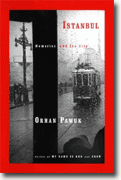Istanbul
Orhan Pamuk
book reviews:
· general fiction
· chick lit/romance
· sci-fi/fantasy
· graphic novels
· nonfiction
· audio books
· author interviews
· children's books @
curledupkids.com
· DVD reviews @
curledupdvd.com
newsletter
win books
buy online
links
home
for authors
& publishers
for reviewers

 |
Istanbul: Memories and the City Orhan Pamuk Knopf Hardcover 400 pages June 2005 |
|
Orhan Pamuk is Turkey’s leading novelist, a man who enjoys celebrity status. In February 2005, he kicked up a national debate when he spoke with the Swiss paper Tages-Anzeiger of the Turkish genocide of the Armenians, which led the Turkish government to bring criminal charges against him for anti-nationalism. Government condemnation was not all. In the Turkish province of Sitculur, the governor ordered that Pamuk’s books be destroyed; it was Pamuk’s popularity that prevented book bonfires.
Says Pamuk in Istanbul, “Conrad, Nabokov, Naipaul-these are writers known for having managed to migrate between languages, cultures, countries, continents, and even civilizations.” But great literature can also come out of never having gone away – even of having stayed on in the same city and same home: Here we come to the heart of the matter: I’ve never left Istanbul, never left the houses, streets, and neighborhoods of my childhood. Although I’ve lived in different districts from time to time, fifty years on I find myself back in the Pamuk Apartments, where my first photographs were taken and where my mother first held me in her arms to show me the world.But Istanbul is also the city where Pamuk experiences hüzün, the Turkish word for melancholy. Hüzün isn’t exactly melancholy or angst: it is closer to tristesse, denoting the collective pain of a people, the feeling of sadness, nostalgia and defeat at the thought of the bygone era and lost glory. The essence of hüzün lies in Istanbul itself. From the early sunsets to the ferries on the Bosphurus to the old booksellers and barbers to unemployed men, Pamuk can see hüzün everywhere - as he can see the traces of ruins of the Ottoman rule (as he is wont to call it, rather than “empire”) that pervade the city, heightening its sense of melancholy. Today’s Istanbul feels more at ease using grocery stores and coffee houses as landmarks instead of old structures in ruin. Rich in detail, Istanbul is a sketch of life, art and culture of Pamuk’s city, and there are both beauty and sadness in Pamuk's narration as he intertwines his own life with that of the city. Black and white photographs throughout the text do their bit to further fuel the feeling of grief. In other words, more hüzün. Originally published on Curled Up With A Good Book at www.curledup.com. © Shampa Chatterjee, 2006 |
|
|
|
 Click here to learn more about this month's sponsor! |
|
| fiction · sf/f · comic books · nonfiction · audio newsletter · free book contest · buy books online review index · links · · authors & publishers reviewers |
|
| site by ELBO Computing Resources, Inc. | |
 Ironically, when you read Pamuk’s part autobiography, part biography of a cityIstanbul, “anti-national” is the label farthest from your mind. Anything but that, you tell yourself. Istanbul as a culture, indeed a civilization, runs through Pamuk’s veins. And expectedly so. Except for a brief stint in New York, he has never left his city.
Ironically, when you read Pamuk’s part autobiography, part biography of a cityIstanbul, “anti-national” is the label farthest from your mind. Anything but that, you tell yourself. Istanbul as a culture, indeed a civilization, runs through Pamuk’s veins. And expectedly so. Except for a brief stint in New York, he has never left his city.